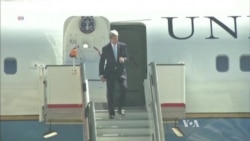AMMAN —
U.S. Secretary of State John Kerry is in Jordan in hopes of jumpstarting Middle East peace talks, just as Arab leaders said they will never recognize Israel as a Jewish state.
Kerry met with Jordan's King Abdullah after arriving in Amman Wednesday. He plans to also hold talks with Palestinian President Mahmoud Abbas in a bid to narrow gaps in peace negotiations between Israel and the Palestinians.
But at a summit in Kuwait Wednesday, the 22-member Arab League released a statement rejecting any consideration of Israel as the homeland of the Jewish people.
Kerry's talks in Amman come ahead of Israel's scheduled release of a fourth round of Palestinian prisoners.
The releases are part of a deal that led the two sides to resume negotiations last year. Israel has not confirmed Friday's release will take place, and Palestinian leaders have threatened to walk away from the peace talks if they do not.
Kerry is also due to speak with Israeli Prime Minister Benjamin Netanyahu, either by phone or video conference.
The parties involved in the peace talks have not publicly discussed the details of the negotiations, but there has been little visible progress on narrowing gaps on major issues. These include the status of Jerusalem, the fate of Palestinian refugees, borders and security.
Narrowing gaps
While U.S. officials say Kerry is here to "narrow the gaps" in peace talks, his more immediate challenge is figuring out what each side might be willing to continue if Israel refuses the prisoner release and if Palestinians respond by pushing tougher international sanctions against Israel.
Nothing has taken more of Kerry's time as secretary of state than Mideast peace. And his visit here underscores the seriousness of the threat to that process as he has broken away from President Obama's talks in Europe on the crisis in Ukraine.
American University professor Hillary Mann Leverett says Mideast peace talks are critical for Washington.
"Not only does it calm some of the tensions, allow some confidence-building measures among the parties to keep it relatively calm between Israelis and Palestinians," Leverett noted. "But even more importantly, strategically for the United States it allows other countries like the Saudis, like the Egyptians to partner with us in ways that would otherwise be impossible for them."
Not much progress
Former U.S. ambassador Adam Ereli says the Obama administration has made little progress convincing either side of the benefits of a two-state solution.
"The longer you go without a settlement the more unstable and explosive the situation becomes," the ambassador said. "But pushing the parties together and pushing the parties to compromise for less than what they think is their minimum required is going to be very difficult."
Among the issues dividing Israelis and Palestinians is security, the borders of a two-state solution, and the status of Jerusalem as a capital.
A State Department spokesperson says the secretary of state will travel to Brussels, Algiers and Rabat from April 1-3. In Brussels, Kerry will meet with counterparts to discuss the ongoing crisis in Ukraine. He will meet with senior officials in Algeria and Morocco.
Kerry met with Jordan's King Abdullah after arriving in Amman Wednesday. He plans to also hold talks with Palestinian President Mahmoud Abbas in a bid to narrow gaps in peace negotiations between Israel and the Palestinians.
But at a summit in Kuwait Wednesday, the 22-member Arab League released a statement rejecting any consideration of Israel as the homeland of the Jewish people.
Kerry's talks in Amman come ahead of Israel's scheduled release of a fourth round of Palestinian prisoners.
The releases are part of a deal that led the two sides to resume negotiations last year. Israel has not confirmed Friday's release will take place, and Palestinian leaders have threatened to walk away from the peace talks if they do not.
Kerry is also due to speak with Israeli Prime Minister Benjamin Netanyahu, either by phone or video conference.
The parties involved in the peace talks have not publicly discussed the details of the negotiations, but there has been little visible progress on narrowing gaps on major issues. These include the status of Jerusalem, the fate of Palestinian refugees, borders and security.
Narrowing gaps
While U.S. officials say Kerry is here to "narrow the gaps" in peace talks, his more immediate challenge is figuring out what each side might be willing to continue if Israel refuses the prisoner release and if Palestinians respond by pushing tougher international sanctions against Israel.
Nothing has taken more of Kerry's time as secretary of state than Mideast peace. And his visit here underscores the seriousness of the threat to that process as he has broken away from President Obama's talks in Europe on the crisis in Ukraine.
American University professor Hillary Mann Leverett says Mideast peace talks are critical for Washington.
"Not only does it calm some of the tensions, allow some confidence-building measures among the parties to keep it relatively calm between Israelis and Palestinians," Leverett noted. "But even more importantly, strategically for the United States it allows other countries like the Saudis, like the Egyptians to partner with us in ways that would otherwise be impossible for them."
Not much progress
Former U.S. ambassador Adam Ereli says the Obama administration has made little progress convincing either side of the benefits of a two-state solution.
"The longer you go without a settlement the more unstable and explosive the situation becomes," the ambassador said. "But pushing the parties together and pushing the parties to compromise for less than what they think is their minimum required is going to be very difficult."
Among the issues dividing Israelis and Palestinians is security, the borders of a two-state solution, and the status of Jerusalem as a capital.
A State Department spokesperson says the secretary of state will travel to Brussels, Algiers and Rabat from April 1-3. In Brussels, Kerry will meet with counterparts to discuss the ongoing crisis in Ukraine. He will meet with senior officials in Algeria and Morocco.





